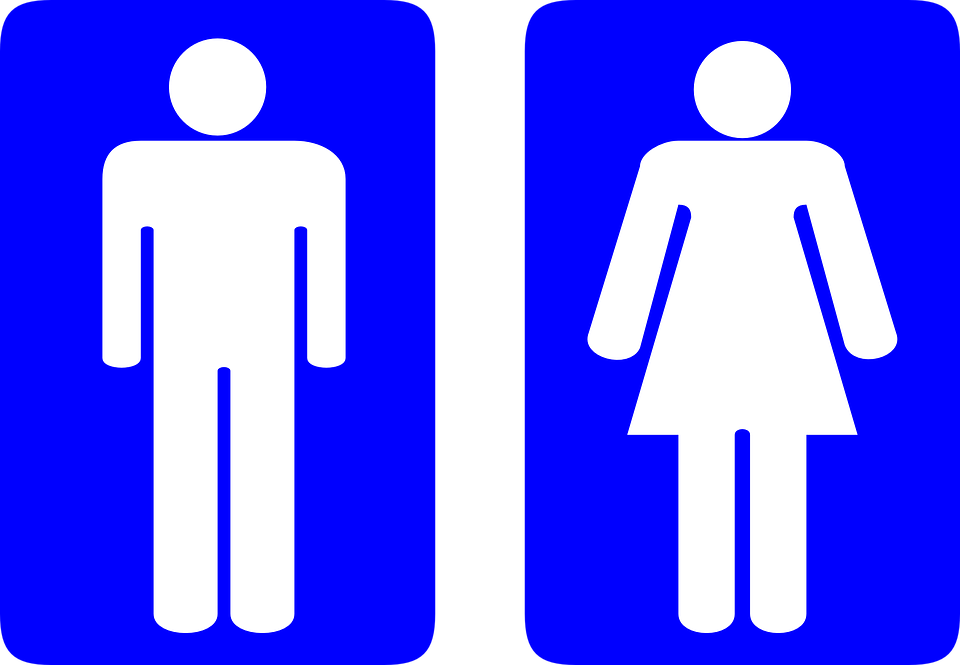Is the United States Court of Appeals for the Fourth Circuit a court of the United States? This sounds like an absurd question. Of course the Fourth Circuit is a court, and of course it is constituted to exercise the powers enumerated in Article III of the United States Constitution. It hears appeals from cases and controversies over which the Constitution and the Congress have given inferior federal tribunals jurisdiction. As everyone who has passed a bar exam knows, that is what makes a particular institution a court of the United States.
Yet “what everyone knows” is no longer so in the Fourth Circuit. In fact, stating expressly what everyone has always known now might be an act of “hostility” in the Fourth Circuit, according to two judges who sit on the Fourth Circuit who issued a majority opinion. And a suggestion that was laughable until just now—that separate restrooms for males and females can be sex discrimination—is the holding of that opinion. That holding is not merely to be taken seriously, but might become the law of the Fourth Circuit. It might become the law, that is, if the United States Court of Appeals for the Fourth Circuit is a court of the United States.
Why might the Fourth Circuit not be a court? The question springs to mind when reading the opinion in Grimm v. Gloucester County School Board, which calls many self-evident truths into question. You’ve probably heard or read about the case, a dispute arising under Title IX, a federal law that governs what actions by educational institutions constitute unlawful sex discrimination. In ruling that a school district may commit unlawful sex discrimination within the meaning of Title IX by maintaining separate restrooms for biological males and biological females, the Fourth Circuit called into question what everyone knew to be so at the time that Title IX was promulgated, and what has always been so throughout human history until now.
Are Single-Sex Bathrooms Really Discriminatory?
Start your day with Public Discourse
Sign up and get our daily essays sent straight to your inbox.Gloucester County in Virginia has a school district. The school district has a bathroom policy, promulgated in order “to provide a safe learning environment for all students and to protect the privacy of all students.” Toward that end, the policy provides that schools in the district shall “provide male and female restroom and locker room facilities in its schools, and the use of said facilities shall be limited to the corresponding biological genders, and students with gender identity issues shall be provided an alternative appropriate private facility.”
G.G., a student in the district, is biologically female. Female is her sex, as the Fourth Circuit panel majority correctly noted. Her gender identity is male. She has a condition known as gender dysphoria, in which one’s gender identity is not consistent with one’s sex.
In satisfaction of its policy, Gloucester County provided an appropriate private bathroom facility for G.G. But G.G. wants to use the bathrooms provided for males. She sued Gloucester County alleging sex discrimination under Title IX.
Title IX expressly provides that the Gloucester County school’s policy is not sex discrimination. The statute provides that “nothing contained herein shall be construed to prohibit any educational institution receiving funds under this Act, from maintaining separate living facilities for the different sexes.” A regulation in the Code of Federal Regulations, promulgated by the Department of Education, interprets the statute to mean that the school “may provide separate toilet, locker room, and shower facilities on the basis of sex, but such facilities provided for students of one sex shall be comparable to such facilities provided for students of the other sex.”
Yet G.G. argued that Gloucester County engaged in sex discrimination by not allowing her to use the boys’ room. The Fourth Circuit majority ruled that the district court wrongly dismissed G.G.’s claim and must consider whether G.G. is entitled to an injunction requiring the school district to allow her to use the boys’ restroom. As applied to G.G., the majority reasoned, the law is indeterminate. So the majority instructed the district court to follow an opinion letter written by the Department of Education.
Opinion vs. Law
In a scathing dissent, Judge Paul Niemeyer comes just short of accusing the majority of lawless judicial activism, noting that the majority has no legal authority for its conclusion. The suggestion is that the result was predetermined by the judges’ opinions and not directed by law:
To accomplish its goal, the majority relies entirely on a 2015 letter sent by the Department of Education’s Office for Civil Rights to G.G., in which the Office for Civil Rights stated, “When a school elects to separate or treat students differently on the basis of sex [when providing restrooms, locker rooms, shower facilities, housing, athletic teams, and single-sex classes], a school generally must treat transgender students consistent with their gender identity.”
Every source of law known to Anglo-American jurisprudence runs counter to the view expressed in that opinion letter. Common law, cultural and customary norms, natural law, and the text of Title IX and its interpreting regulations: all affirm that Gloucester County’s policy is lawful.
Yet the majority adopted the DOE’s opinion letter as law, against the weight of all the actual law. As Judge Niemeyer points out:
This unprecedented holding overrules custom, culture, and the very demands inherent in human nature for privacy and safety, which the separation of such facilities is designed to protect. More particularly, it also misconstrues the clear language of Title IX and its regulations.
Significantly, the majority did not find that the language of Title IX is ambiguous, explaining:
First, we have little difficulty concluding that the language itself—“of one sex” and “of the other sex”—refers to male and female students. Second, in the specific context of [the regulation interpreting Title IX], the plain meaning of the regulatory language is best stated by the United States: “the mere act of providing separate restroom facilities for males and females does not violate Title IX . . . .” . . . Third, the language “of one sex” and “of the other sex” appears repeatedly in the broader context of [the regulations governing schools.] This repeated formulation indicates two sexes (“one sex” and “the other sex”), and the only reasonable reading of the language used throughout the relevant regulatory section is that it references male and female. Read plainly then, [the law] permits schools to provide separate toilet, locker room, and shower facilities for its male and female students. By implication, the regulation also permits schools to exclude males from the female facilities and vice-versa.
Nor did the Fourth Circuit invoke any lawful authority for giving binding, legal effect to the Department of Education’s opinion letter. There is no such authority. The majority correctly noted that it is bound by law not to defer to an agency’s interpretation of an unambiguous statute or regulation.
Introducing Ambiguity Where None Exists
So the law is not ambiguous, and the Fourth Circuit is bound to apply it to the case. Nevertheless, the majority determined that the application of the law to G.G. is ambiguous because G.G., though biologically a girl, understands herself to be a boy. And Title IX “is silent as to how a school should determine whether a transgender individual is a male or female for the purpose of access to sex-segregated restrooms.” Therefore, as applied to G.G., the unambiguous concepts of maleness and femaleness that are codified in Title IX are indeterminate.
Naturally, the statute is silent because everyone knows that sex refers to sex, and not gender identity. Anyway, everyone knew that before last week. Now what everyone knows should not be said publicly. At a public hearing to discuss Gloucester County’s bathroom policy, members of the public referred to G.G. as a “girl” and a “young lady.” The Fourth Circuit majority opined that, by referring to her by her sex, these “speakers displayed hostility to G.G.” Presumably, the majority viewed this as evidence of unlawful discrimination.
The majority assumes (it does not demonstrate) that an unambiguous law that applies straightforwardly to everyone else does not apply to a person who is biologically female but considers herself male. On the majority’s logic, G.G.’s subjective understanding alters the meaning of an unambiguous, federal law. And it alters the meaning of the law for everyone in the Gloucester County school district and, potentially, everyone who resides in Maryland, Virginia, West Virginia, North Carolina, and South Carolina, those states whose federal district courts are bound by precedents of the Fourth Circuit.
Office Dysphoria
In this light, return to the question with which this essay begins. Is the Fourth Circuit a court? On the Fourth Circuit’s approach to legal interpretation, it is not so laughable a question as it once was.
The United States Code defines “courts of the United States” to include “the Supreme Court of the United States, courts of appeals, district courts . . . and any court created by Act of Congress the judges of which are entitled to hold office during good behavior.” That definition is not ambiguous. But it might now be ambiguous as applied to the Fourth Circuit.
If “male” and “female” are rendered ambiguous when applied to a female who does not understand herself to be possessed of the characteristics of females, might not “court” and “judge” be rendered ambiguous when applied to institutions and officials who do not understand themselves to be possessed of the characteristics of courts and judges? Courts and judges of the United States are institutions and officials, respectively, who, in the words of Alexander Hamilton, exercise neither force nor will but merely judgment. In other words, courts and judges do not rewrite unambiguous laws.
Everyone knew that until just now. Now judges of the Fourth Circuit appear to suffer from office dysphoria, a condition in which their power identity is inconsistent with the powers of the office they hold. As applied to them, the unambiguous concepts of court-ness and judge-ness are indeterminate.
Article III of the Constitution provides that “judges,” whoever they are, “shall hold their Offices during good Behaviour, and shall, at stated Times, receive for their Services, a Compensation, which shall not be diminished during their Continuance in Office.” Has the Department of Education written any opinion letters on the meaning of life tenure and salary protection?













